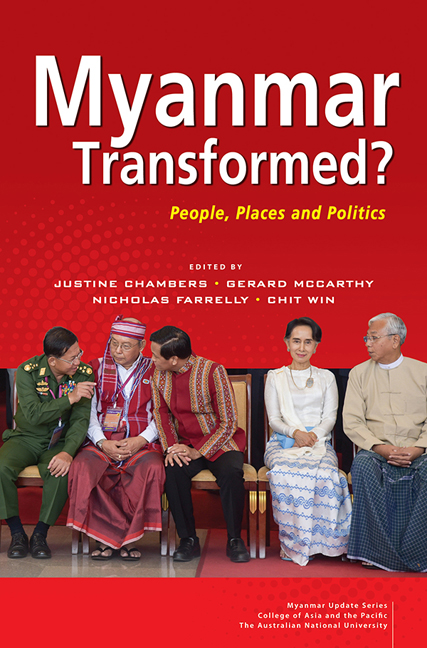13 - Reflections on Myanmar Under the NLD so far
from Part V - Epilogue
Published online by Cambridge University Press: 12 February 2019
Summary
2016 was supposed to be the time for change in Myanmar. Swept to power on the strength of that slogan, the National League for Democracy would finally get to form a government and realize a democratic transition decades in the making. Even the most cynical Myanmar observer could find reasons to be excited about this crucial step in the process of transferring power from the military to civilian leaders. Yes, the 2008 Constitution still institutionalized military rule in a variety of ways. Yes, a host of seemingly intractable problems remained, including a lagging peace process with ethnic armed groups and persistent anti-Muslim sentiment—especially toward the Rohingya. And yes, it was worrying that the party that was about to take over governing had virtually no experience in doing so, and hadn't really demonstrated much expertise (or interest) in policy development throughout its single-minded campaign. Even with all of these concerns, to see Daw Aung San Suu Kyi and her colleagues achieve the victory that had been deferred since 1990 gave reason to hope that her widespread support could translate into progress in national reconciliation, economic development, political reform, and a host of other areas.
This political update was originally presented in February 2017, weeks away from the NLD government's first anniversary. At that time, I noted that it was not easy to find the success stories. Indeed, having now passed the second anniversary, in most respects, the situation looks frustratingly not only bleaker than it was a year in, but worse than it did under the previous USDP government. With the international outcry against Myanmar's actions against the Rohingya showing no signs of abating, and the long-term effects of that conflict being added to an already-long list of challenges, the country's prospects for further political or economic development are dimming.
ETHNIC CONFLICT AND THE PEACE PROCESS
Eager to show its commitment to national reconciliation, the NLD sought to prioritize the peace process. When Daw Aung San Suu Kyi re-branded the national political dialogue as the “21st Century Panglong Conference,” it was a chance to establish her government's ownership over the process and inject a new spirit by linking it to the famous conference convened by her father in 1947.
- Type
- Chapter
- Information
- Myanmar Transformed?People, Places and Politics, pp. 311 - 318Publisher: ISEAS–Yusof Ishak InstitutePrint publication year: 2018



